SAP Commerce Cloud Training
Introduction to SAP Commerce Cloud
SAP Commerce Cloud Training SAP, one of the industry-leading corporate software vendors, provides various solutions, including SAP Commerce Cloud Training.

Customer Engagement and Commerce Platform hosted in the Cloud Provides companies with an effective means for providing their consumers with tailored omnichannel experiences that are unique yet seamless.
SAP Commerce Cloud training programs aim to equip businesses and people with the knowledge and abilities to take full advantage of this platform.
Training covers various subjects, such as interactions between SAP systems and storefronts, platform architecture design and product administration, and storefront customisation.

SAP Commerce Cloud Training

Businesses investing in SAP Commerce Cloud training stand to benefit in numerous ways, including enhanced customer interactions, higher sales levels and more efficient business operations.
Training services help businesses maximise the return on their SAP Commerce Cloud investments by giving participants a thorough knowledge of its features.
People and companies looking to leverage SAP Commerce Cloud Training’s powerful platform to enhance customer experiences while driving company expansion should undoubtedlyparticipate.
About SAP Commerce Cloud
SAP Commerce Cloud was designed with adaptability in mind to address the requirements of various-sized organisations.
Provides an integrated set of tools and capabilities to manage all aspects of online commerce – product catalogue management, customer experience management, online content administration and order administration, to name a few.
With SAP Commerce Cloud, companies can effortlessly build and manage online storefronts while improving and customising customer experiences, optimising sales processes and increasing productivity – ultimately leading to higher income potential.

Additionally, this platform features additional tools like marketing automation, client segmentation and real-time analytics to assist companies in making data-based decisions and increasing online sales.
SAP Commerce Cloud is part of SAP Customer Experience Suite, an umbrella solution with marketing, sales and support modules and solutions designed to foster customer interactions and commerce. Together, these components form comprehensive customer interaction solutions.
Due to this connectivity, companies can now offer customers an integrated and satisfying customer journey at all touchpoints – including browsing, purchasing and post-sale assistance.

SAP Commerce Cloud
Online Training

Benefits of SAP Commerce Cloud
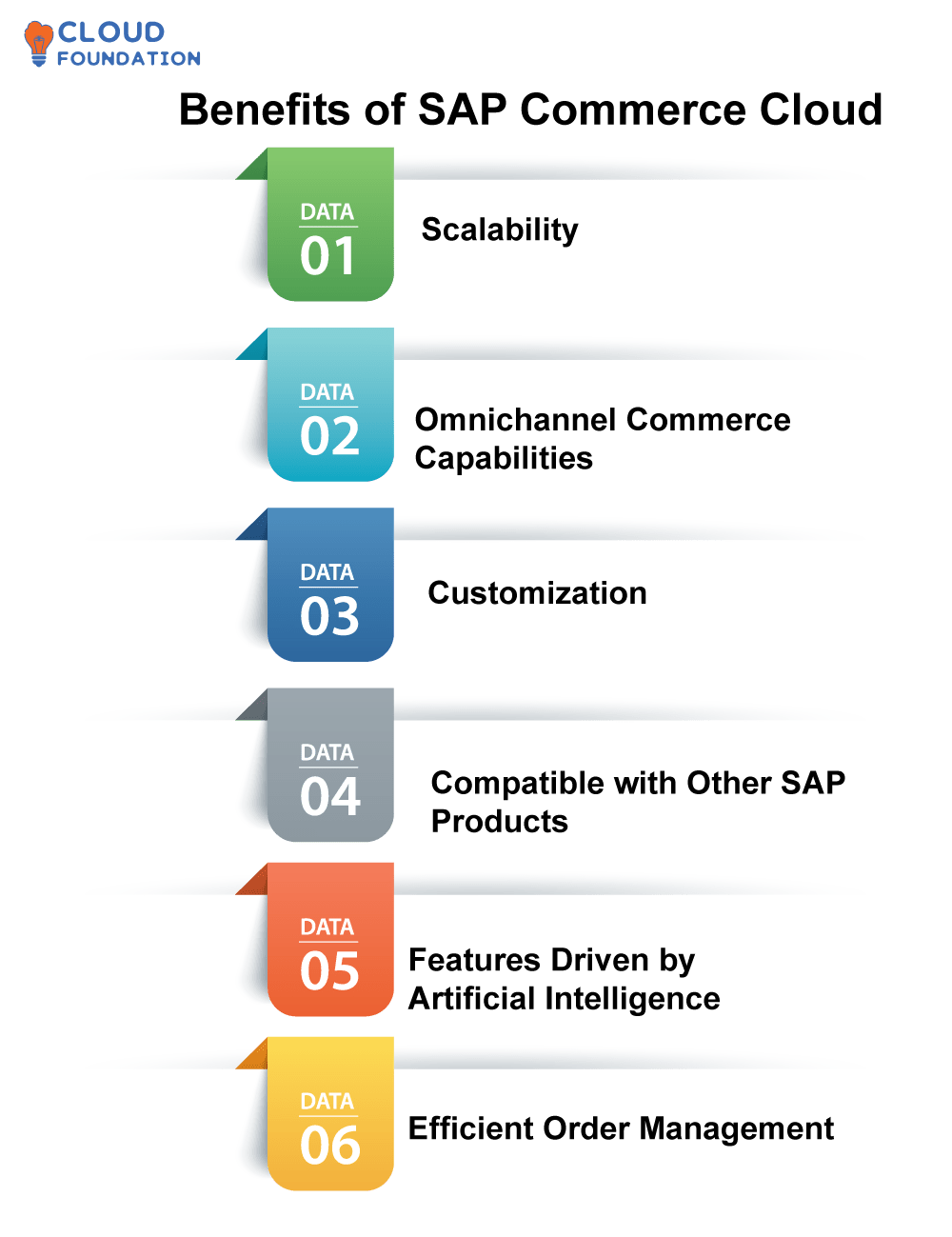
Scalability: SAP Commerce Cloud offers expanding enterprises the ability to scale quickly as it adapts to fluctuations in traffic levels and demand for its services. With a flexible infrastructure that rapidly responds, SAP Commerce Cloud makes expanding easier.
Omnichannel Commerce Capabilities: With SAP Commerce Cloud, organisations have the power to offer customers a uniform shopping experience across channels–online, mobile, social media and physical store locations alike.
Customization: This platform boasts powerful customisation features, enabling companies to offer consumers tailored purchasing experiences, increasing satisfaction and loyalty.
Compatible with Other SAP Products: The SAP Commerce Cloud can easily integrate with other SAP products like ERP, CRM and Marketing Cloud systems for easy connectivity between companies and their clients and an organised perspective and simplified operations. This enables companies to gain a unified view of customers while streamlining operations.
Features Driven by Artificial Intelligence: The platform uses Artificial Intelligence (AI) and machine learning technologies to deliver advanced features, including predictive analytics, product suggestions and intelligent search. This enables companies to offer clients purchasing experiences more tailored and pertinent to their needs.
Efficient Order Management: SAP Commerce Cloud provides organisations with a robust order management solution, allowing them to handle orders across various distribution channels from one central hub – improving the customer experience! By doing this, errors are reduced while efficiency improves and experiences improve for consumers.
Prerequisite of SAP Commerce Cloud
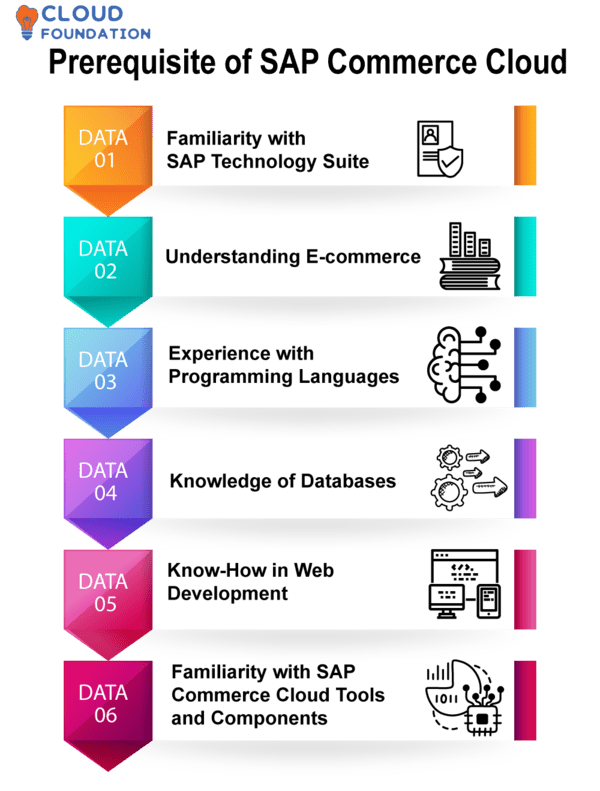
Familiarity with SAP Technology Suite
To operate with SAP Commerce Cloud successfully, one must possess an in-depth knowledge of its software suite: components and modules making up SAP; architecture of its implementation possibilities and integration strategies available within it; as well as possible integration options available between them and SAP Commerce Cloud.
Understanding E-commerce:E-commerce entrepreneurs must grasp e-commerce concepts and best practices, including online merchandising, customer experience management, order administration processes and digital marketing.
Experience with Programming Languages: As SAP Commerce Cloud is built around Java programming language, an excellent grasp of this form is required for success. Similarly, knowing other programming languages and web technologies such as HTML5, JavaScript, or CSS would also prove highly advantageous.
Knowledge of Databases: SAP Commerce Cloud utilises relational database management systems such as MySQL or Oracle to store and retrieve information, so in-depth knowledge of database principles, SQL and data modelling is crucial for optimal use.
Know-How in Web Development: For working on SAP Commerce Cloud, you must possess an in-depth knowledge of web development fundamentals and its relevant technologies, including APIs, web servers and online services.
Familiarity with SAP Commerce Cloud Tools and Components: Acquaintance with all the tools included with SAP Commerce Cloud is essential, such as its platform cockpit, back-office administration tool and APIs.
How to learn SAP Commerce Cloud
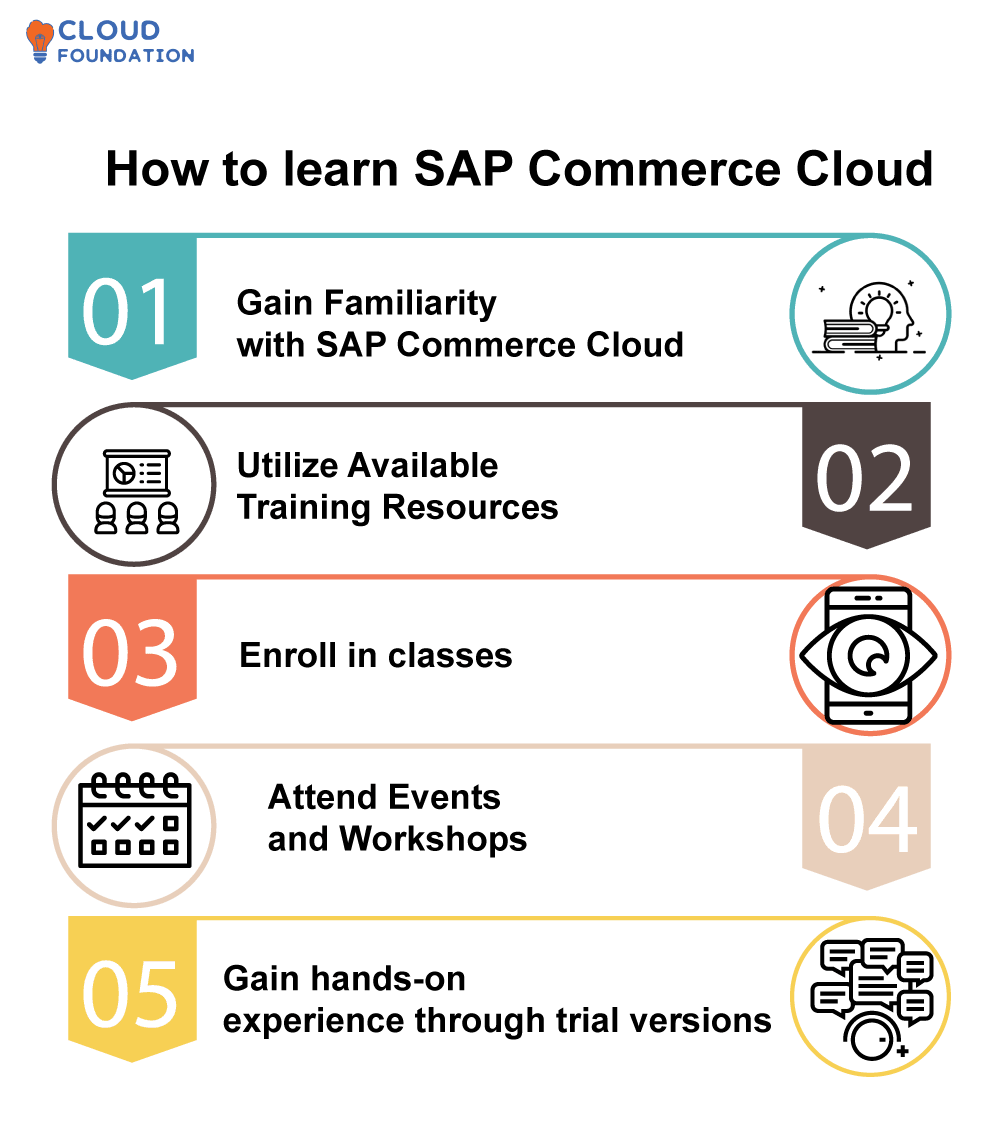
Gain Familiarity with SAP Commerce Cloud
To start learning SAP Commerce Cloud effectively, familiarise yourself with its technology. This step should introduce what SAP Commerce Cloud is as an enterprise e-commerce platform and its features and benefits; specifically, it assists companies in providing personalised omnichannel shopping experiences tailored to individual shopper preferences.
Utilize Available Training Resources SAP provides numerous learning materials – online courses, tutorials, webinars and documentation – to assist users with setting up SAP Commerce Cloud. You may access these materials through their website or the SAP Learning Hub learning platform.
Enroll in classes. The SAP Learning Hub offers classes tailored specifically for users at all experience and knowledge levels – role-based types can provide an in-depth understanding of SAP Commerce Cloud’s architecture, installation procedures and customisation features – giving participants an in-depth education on SAP Commerce Cloud’s features, such as its architecture. By joining these sessions you’ll get an immersive education in its use!
Attend Events and Workshops: SAP regularly organises events such as conferences and user group meetings that bring together SAP professionals, partners, customers and experts from related sectors for networking purposes and to gain real-world experiences that provide learning. By joining these events, you have an excellent opportunity for self-education while simultaneously networking.
Gain hands-on experience through trial versions: the SAP Commerce Cloud offers a free 30-day trial version to provide users with hands-on experience of its features and functionalities. Please take full advantage of it!
Modes of learning SAP Commerce Cloud
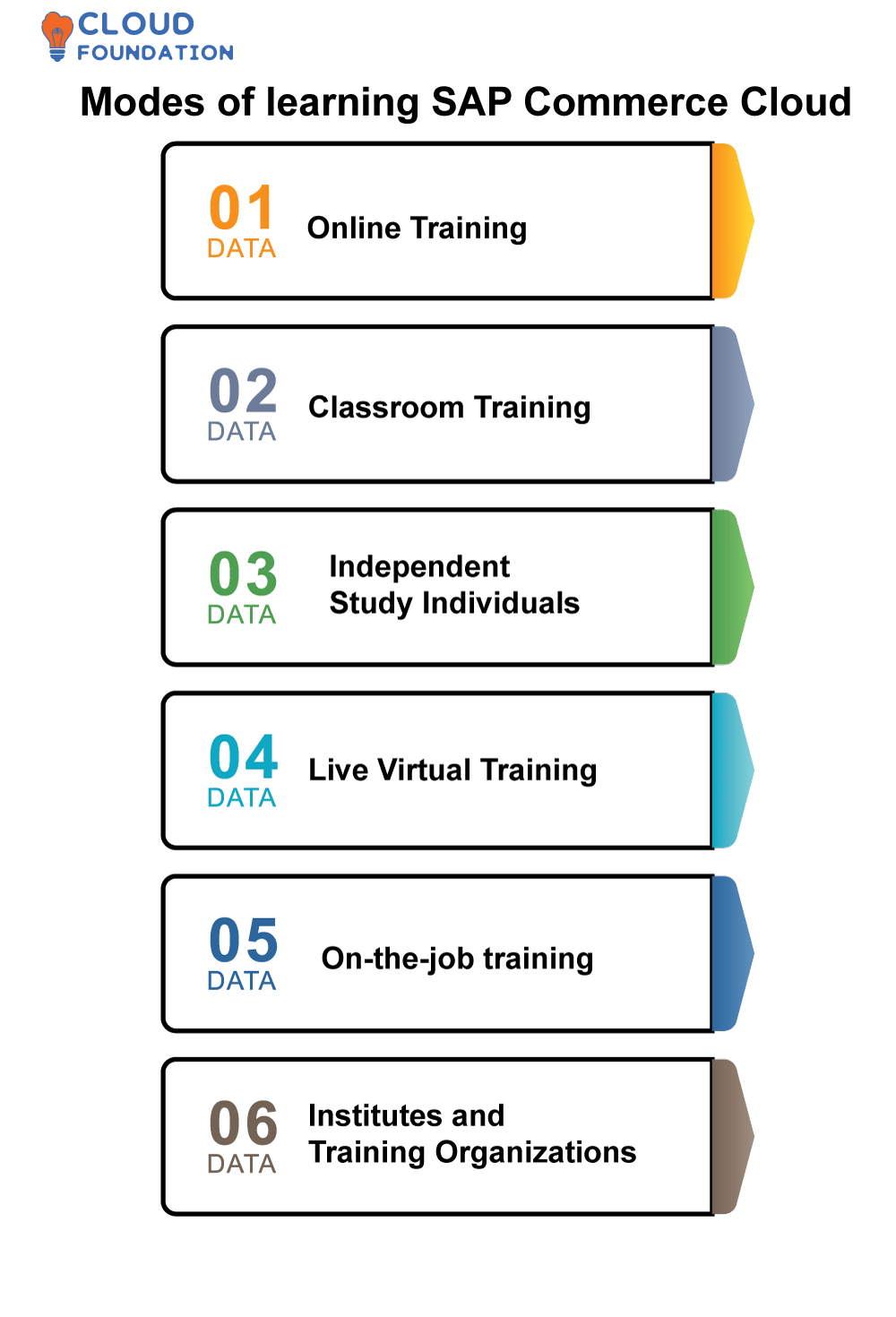
Online Training: One of the easiest and most flexible ways of studying SAP Commerce Cloud is participating in online training courses, where individuals can study at their own speed without leaving home. These training modules often consist of pre-recorded videos, interactive quizzes and hands-on activities designed to give users an understanding of its core fundamentals.
Classroom Training: Another popular means of learning SAP Commerce Cloud is classroom training sessions led by an instructor in person with other students present. Classroom sessions create a more dynamic learning experience by allowing questions to be asked and receiving instantaneous responses in the form of instant feedback on responses from an instructor and other classmates.
Independent Study Individuals who prefer studying solo may benefit from using an independent study approach for learning SAP Commerce Cloud concepts. Acquiring this understanding requires consulting various materials – study manuals, books, and websites can all aid learning efforts independently. People unable to commit to regular classes may find that independent study offers better results.
Live Virtual Training: Live virtual training involves attending virtual courses taught by an instructor in real-time with participants engaging with both them and each other, just as if attending physical lessons would.
Participants have direct dialogue with both instructors and classmates as they would in traditional classes; further, this form of education allows participants to communicate freely between lessons just like any regular classroom setting would allow – making this alternative suitable for anyone missing physical tasks but wanting the interaction and structure offered therein.
On-the-job training (aka hands-on training) is when employees gain knowledge by participating in actual world initiatives and responsibilities. Businesses commonly employ this form of education to educate staff members on SAP Commerce Cloud. Itallows learners to gain practical experience while being taught directly by experts with extensive expertise.
Institutes and Training Organizations Offer Courses Leading to SAP Commerce Cloud Certification Individuals can find certification courses beneficial when trying to strengthen their CV or gain more insight into SAP Commerce Cloud; examinations, practical exercises, classroom or online instruction and exams all feature prominently within these educational programs. Taking one of these certification programs might just be what’s necessary!
Training on SAP Commerce Cloud
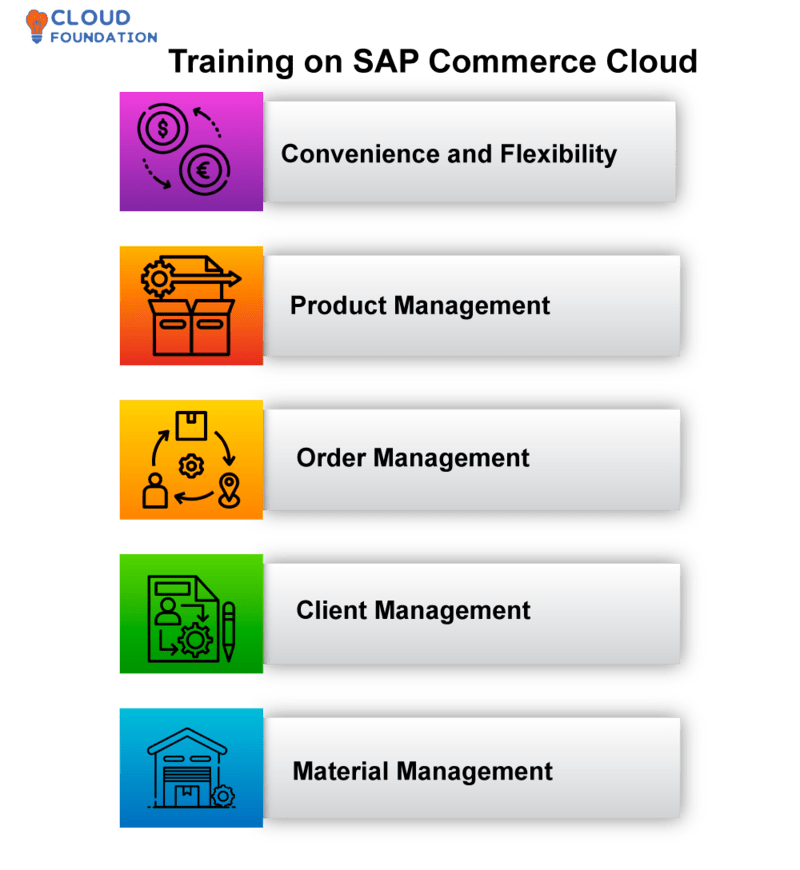
Convenience and Flexibility:Your team should receive training on the fundamentals of SAP Commerce Cloud, such as its architecture, features and capabilities. As a result, they will better grasp its components working effectively on this platform.
Product Management: Train your staff to use the platform effectively by explaining how to create and modify product catalogs, manage product data, set pricing/promotion structures and set prices/promos for products.
Order Management: Provide training on how to process orders, fulfill and track them efficiently, manage returns/refunds, and process refunds/credit memos effectively.
Client Management: Provide your staff with the appropriate training in managing client accounts, developing customer segments and making use of customer data for personalized purchasing experiences.
Material Management: Train your staff how to utilize the tools provided by the platform in creating and updating materials for an online shop – landing pages, banner ads and product descriptions among others – using these platforms’ tools and applications.
Benefits of Online Training
Convenience and Flexibility: With online training, individuals can study at their own speed and on their own timetable. They also can access training materials anytime from any location with internet connectivity; making online training the ideal solution for busy professionals with various obligations or mobility restrictions.
More Cost-Effective than TraditionalClassroom Training: As online training eliminates travel costs and supplies costs associated with traditional classroom learning environments, it often offers greater value to both individuals and companies alike. Eco-Friendlier Option for Training Delivery
Access to Diverse Subjects Online education provides access to an expansive selection of classes and subjects not typically found in traditional classroom settings due to their narrow or niche nature, providing individuals with opportunities for acquiring an array of knowledge, skills and information that would otherwise remain unavailable to them.
Access to Top Educators and Subject: Matter Experts Online training can provide participants with access to some of the world’s premier educators and subject matter experts from anywhere around the globe, giving learners direct access to expert knowledge without leaving home. With this advancement in mind, learners no longer need to leave home to access this wealth of experience that seasoned professionals in their respective field can bring.
Engaging through Interaction: Many online training programs feature engaging interactive elements like videos, quizzes and discussion forums that make the learning experience more dynamic and motivating; encouraging collaboration among classmates as they network together with fellow learners.
Learning at Your Own Pace: Receiving training online offers another advantage – learning at Your own Speed – making this ideal for people needing extra time to comprehend complex ideas.
Job Opportunities of SAP Commerce Cloud
E-Commerce Developer (with SAP Commerce Cloud experience): As an e-commerce developer for SAP Commerce Cloud, your role will include designing, creating and editing online shops for customers using this platform. Depending on where the customers reside in their region and you working remotely or not.
To be effective at this position you will require knowledge in e-commerce fundamentals, web development languages as well as architecture for SAP Commerce Cloud platforms.
Business Analyst: Business analysts with expertise in SAP Commerce Cloud are in high demand as they play an essential role in understanding client needs and mapping them against capabilities available from SAP Commerce platform – they must fully comprehend customer expectations!
Responsibilities associated with this role may include analysis of business processes, documentation of requirements and identification of opportunities for improvement.
Solutions Architect: Experienced solutions architects working with SAP Commerce Cloud can create end-to-end e-commerce solutions for customers, using both knowledge of its architecture and ability to tailor solutions specifically tailored for company requirements. In this role, successful candidates require in-depth expertise of this platform’s technology for this job role.
Project Manager (SAP Commerce Cloud): You will be charged with overseeing the execution of SAP Commerce projects from their inception through completion, overseeing timetables, finances and resources while adhering to industry standards and producing desired results for an organization.
CloudFoundation will help professionals learn more about everything from videos and course.

SAP Commerce Cloud
Course Price

